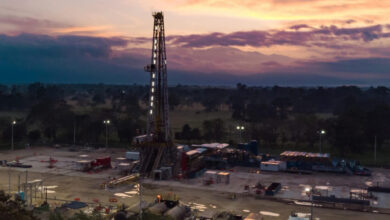Green energy falls short in shadow of oil and gas
By Joanne Liou, editorial coordinator
In the coming age of technological advancements and innovation, renewable energy falls to the wayside in the energy market – further emphasizing sustainability and reliability in the oil, gas and coal industries. “Dense energy rules,” declared Robert L Bradley Jr, CEO and founder of the Institute for Energy Research.
Dismissing the effectiveness and efficiency of renewable energy, such as wind, solar and hydropower, Mr Bradley expressed a strong foothold in carbon-based energies at the IADC/American Petroleum Institute Houston Chapter meeting on 13 September in Houston.
Arguing against green energies, Mr Bradley displayed a chunk of coal, which he credited as the enabler of the industrial revolution, to explain its unmatched potential. “What we had before was basically falling water, the wind … but a lot of it was biomass – burning plants and woods,” he said. “But plants and wood are really baby coal because it’s the energy of the sun for just a certain number of years. This (coal) is the energy of the sun for 10, 100 and million years. It’s no mystery that the carbon-based energies are so much more dense and productive than what came before.”
The intermittency and uncontrollable variables of renewable sources of energy creates a lingering cloud of uncertainty and instability. Mr Bradley questioned the outcome of a “bad” water year in relation to hydropower and the gaps in service inherent to wind power.
Referencing headlines from the Wall Street Journal from 1978 and more recently, he pointed to similar ideas and expectations that have yet to materialize from renewable resources. “The idea that renewables are our energy future is historically wrong,” Mr Bradley stated. “Renewables are our energy past. The prosperity we have today comes from oil, gas and coal – carbon-based energies.”
Claim to the top spot of the energy market doesn’t go without opposition from the usual suspects – the government and the environmentalists. In addition to debates in pollution, depletion and global warming, the top industries face an ongoing skirmish with the government. “The real challenge for energy affordability, availability and reliability is statism – government intervention in energy.”
In terms of subsidies and regulations, the government has fallen short in its support for the oil and gas industry even though it happens to be the one that provides the greatest returns. “When you look at the level of subsidies, wind and solar are receiving a lot more dollars in absolute terms, and then if you look at the amount of subsidy on an energy-produced metric, such as cents/kwh subsidies for wind and solar are a multiple of that for oil and gas,” Mr Bradley said.
He further expressed concern about a skewed consensus toward the oil and gas industry – one that is often characterized by the ideas of the depleting supply of oil and gas, the perceptions of a growing pollution problem and the threat of climate change. However, Mr Bradley counters those fears and stated that more energy is being used today while emissions are down. The benefits of CO2, not only in cost, are felt in the moderately warmer temperatures, and “a wetter world is a better world,” he added. “A major point is that with oil, gas and coal, we create the wealth. So even if the weather, the climate were worse in the future, we’ll be able to deal with it a lot better than we can today.”
“It’s too simplistic to think of energy as a natural resource. It’s really a man-made one,” according to Mr Bradley, “and it’s free market incentives that allow so-called depleting resources – such as oil, gas and coal – to actually be expanding resources over great periods of time.”




